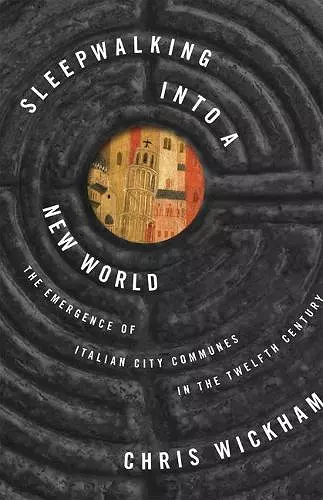Sleepwalking into a New World
The Emergence of Italian City Communes in the Twelfth Century
Format:Paperback
Publisher:Princeton University Press
Published:29th Jun '18
Should be back in stock very soon
This paperback is available in another edition too:
- Hardback£35.00(9780691148281)

A bold new history of the rise of the medieval Italian commune
Amid the disintegration of the Kingdom of Italy in the eleventh and twelfth centuries, a new form of collective government—the commune—arose in the cities of northern and central Italy. Sleepwalking into a New World takes a bold new look at how these autonomous city-states came about, and fundamentally alters our understanding of one of the most important political and cultural innovations of the medieval world.
Chris Wickham provides richly textured portraits of three cities—Milan, Pisa, and Rome—and sets them against a vibrant backcloth of other towns. He argues that, in all but a few cases, the elites of these cities and towns developed one of the first nonmonarchical forms of government in medieval Europe, unaware that they were creating something altogether new. Wickham makes clear that the Italian city commune was by no means a democracy in the modern sense, but that it was so novel that outsiders did not know what to make of it. He describes how, as the old order unraveled, the communes emerged, governed by consular elites "chosen by the people," and subject to neither emperor nor king. They regularly fought each other, yet they grew organized and confident enough to ally together to defeat Frederick Barbarossa, the German emperor, at the Battle of Legnano in 1176.
Sleepwalking into a New World reveals how the development of the autonomous city-state took place, which would in the end make possible the robust civic culture of the Renaissance.
"Wickham's expert analysis and meticulous academic approach build on previous. Limited examinations and substantial documentation to turn established research on its head, as he presents a fresh look into how communes in the mid-12th century successfully prepared Italian power structures for the cultural significance they would later have." * Publishers Weekly *
"Wickham's analysis is meticulous and incisive, and he situates his conclusions clearly in light of the prior historiography." * Choice *
"Wickham's passion for medieval Italian urban history comes across on every page."---Corinne Wieben, H-Net Reviews
"This book provides a useful foray into the internal debates occurring in those movements and thus lends layers of complexity to the overall argument."---Brooke Sherrard, Nova Religio
"Wickham has a deep knowledge of the previous literature in the topic and an awareness of how this is linked to debates with broad ideological implications, such as the origins of Renaissance and of Republican forms of government and values."---Michele Campopiano, Catholic Historical Review
ISBN: 9780691181141
Dimensions: unknown
Weight: unknown
320 pages